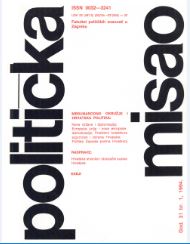Slovenska politika i slovensko-hrvatski odnosi
Slovenian Policy and Slovene-Croat Relations
Author(s): Matija MalešičSubject(s): Diplomatic history, Government/Political systems, International relations/trade, Transformation Period (1990 - 2010)
Published by: Fakultet političkih znanosti u Zagrebu
Keywords: Slovenia; independency; Croatia; relations; diplomacy;
Summary/Abstract: The author presents the conditions in which Slovenia achieved independence: the break up of communism in Yugoslavia and the decision of the Slovene people for democracy; the threat of Greater Serbian policy and the strength of communism in the so-called Yugoslavia; and the international community’s lack of understanding. In spite of unfavorable conditions, Slovenia became an independent state thanks to the successful defense against the aggression of the JNA (Yugoslav People’s Army). After the brief conflict, a high degree of political stability was reached (in spite of the high number of parliamentary political parties), and a successful economic policy was established. Slovenia has a common interest with Croatia in international relations. The author emphasizes that Slovene-Croat relations can be advanced through systematic solving of potential conflicts: the determination of the exact border; obstacles to economic cooperation; protection of property rights; the status of the nuclear plant “Krško”; and the debt of the Bank of Ljubljana.
Journal: Politička Misao
- Issue Year: XXXI/1994
- Issue No: 01
- Page Range: 70-77
- Page Count: 8
- Language: Croatian

